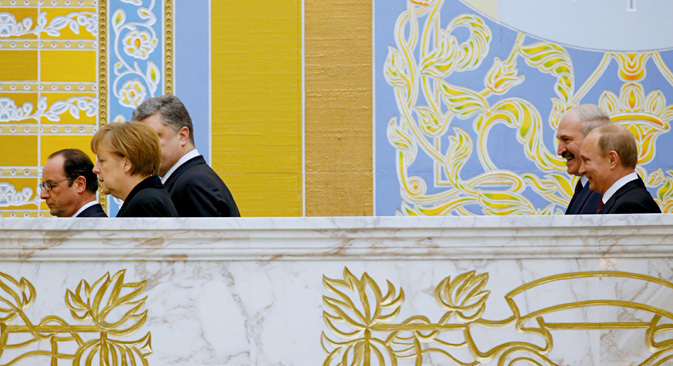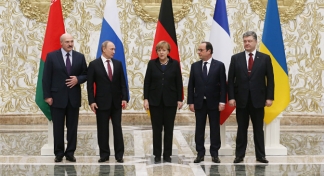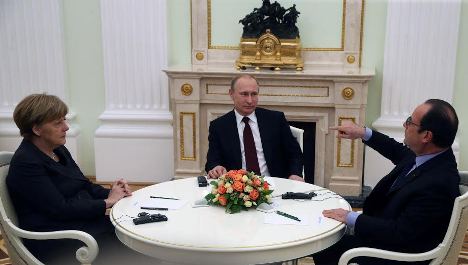Leaders reach Ukraine ceasefire agreement after marathon talks in Minsk

The meeting of the French, German, Russian and Ukrainian leaders in the Belarusian capital Minsk. Source: AP
Following 16 hours of talks in Minsk, Russian President Vladimir Putin, German Chancellor Angela Merkel, French President Francois Hollande and Ukrainian President Petro Poroshenko have agreed on a ceasefire intended as a prelude to a comprehensive political resolution of the Ukrainian crisis.
In parallel to the negotiations between the leaders of the four countries, the Belarusian capital also hosted a meeting of a ‘contact group’ featuring the representatives of Russia, Ukraine, the OSCE and the Donbass rebels.
The difficult two-track negotiations have resulted in the members of the contact group approving a document concerning the implementation of the earlier Minsk protocol, signed in September. At the same time, the leaders of Russia, Ukraine, France and Germany adopted a declaration in which they expressed their support for the document.
Constitutional reform, elections and border control
As Russian President Vladimir Putin told journalists after the talks, the leaders have "managed to agree on the main issues" – first and foremost, a ceasefire beginning at 00:00 on Sunday, Feb. 15.
The parties also have agreed on the withdrawal of heavy weapons from the demarcation line and the establishment of a 50-to-150-km-wide safety zone, according to the media that obtained a copy of the agreement.
The ceasefire is be monitored by the OSCE, which will also oversee the "withdrawal of foreign troops from Ukrainian territory."
The agreement also stipulates the need for early local elections in the Donbass, amnesty for all combatants, the approval by Kiev of a law conferring special status on some areas of the Donbass, and constitutional reform in Ukraine.
The latter assumes the introduction of the country's new main law, the "key element" of which should be the decentralization of power in Ukraine. One of the main issues for the Ukrainian side – the control of the border between Russia and the breakaway regions – will be linked to the new constitution and special legislation for parts of the Donbass.
According to the document, the restoration of control of the border by the Kiev authorities will take place gradually, on condition that the constitutional reform is implemented and in consultation with representatives of the rebels.
Encouraging outcome
Russian observers reacted positively to the immediate outcome of the new talks in Minsk. According to Dmitry Danilov, head of the Department for European Security at the Russian Academy of Sciences’ Institute of Europe, the parties managed to agree on the basic conditions for the further implementation of the peace process – the ceasefire and demarcation line.
Viktor Mizin, an expert on international affairs, described the Minsk agreement as “encouraging.”
However, analysts are generally less optimistic about the leaders' political agreements in the context of the future settlement.
According to Danilov, the parties may have different interpretations of the compromise, particularly with regard to sensitive issues such as the special status of some areas of the Donbass and control of the border.
Much will depend on the behavior of the Kiev leadership, Danilov pointed out. "Now Poroshenko will need to negotiate with his associates and public opinion in Kiev," he told RBTH, noting also that responsibility lies upon the rebels to interpret the deal in such a way as to avoid destroying the agreement that has been reached.
According to Mizin, meanwhile, the issue of the status of the breakaway regions as well as the problem of the Ukrainian-Russian border in some areas of the Donbass remains a "huge unresolved problem," explaining that a failure of the agreement would threaten a full-scale collapse in the east of Ukraine that would be in the interests of neither Russia nor the West.
The full text of Minsk Declaration >>>>
All rights reserved by Rossiyskaya Gazeta.
Subscribe
to our newsletter!
Get the week's best stories straight to your inbox

